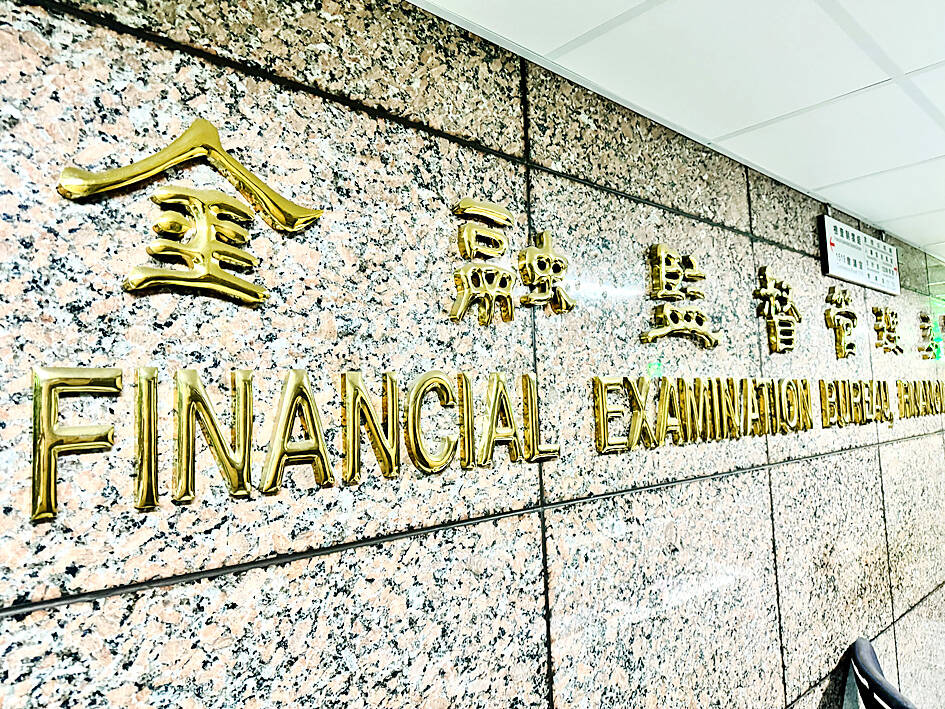The Financial Supervisory Commission late on Tuesday announced plans to effectively block hostile takeovers in the nation’s crowded financial sector, months after preventing a roughly US$4.1 billion deal that would have created Taiwan’s largest financial group.
The commission would amend rules to close the door to nonconsensual mergers and acquisitions to ensure market stability, it said in a statement.
In the future, acquiring financial firms must get a board resolution from the target company indicating no objection, or show that they can secure a majority of shares or board seats to complete the acquisition, the commission said.

Photo: Kelson Wang, Taipei Times
The changes aim to establish an environment for mergers and acquisitions in the financial sector while maintaining market stability, it said, adding that the proposed amendment would be open to public feedback for 60 days.
Last year, the commission rejected CTBC Financial Holding Co’s (中信金控) takeover bid for smaller rival Shin Kong Financial Holding Co (新光金控), citing reasons including potential disputes over management rights.
While Shin Kong Financial then pursued a separate, agreed merger, many analysts have said that Taiwan has too many financial groups for a country of about 23 million people.
The proposed amendments would also demand that public takeovers be paid in cash, to avoid volatility in share prices.
The commission also wants to increase the minimum initial investment by those seeking to take over a financial company, to 25 percent from 10 percent.

CHIP RACE: Three years of overbroad export controls drove foreign competitors to pursue their own AI chips, and ‘cost US taxpayers billions of dollars,’ Nvidia said China has figured out the US strategy for allowing it to buy Nvidia Corp’s H200s and is rejecting the artificial intelligence (AI) chip in favor of domestically developed semiconductors, White House AI adviser David Sacks said, citing news reports. US President Donald Trump on Monday said that he would allow shipments of Nvidia’s H200 chips to China, part of an administration effort backed by Sacks to challenge Chinese tech champions such as Huawei Technologies Co (華為) by bringing US competition to their home market. On Friday, Sacks signaled that he was uncertain about whether that approach would work. “They’re rejecting our chips,” Sacks

NATIONAL SECURITY: Intel’s testing of ACM tools despite US government control ‘highlights egregious gaps in US technology protection policies,’ a former official said Chipmaker Intel Corp has tested chipmaking tools this year from a toolmaker with deep roots in China and two overseas units that were targeted by US sanctions, according to two sources with direct knowledge of the matter. Intel, which fended off calls for its CEO’s resignation from US President Donald Trump in August over his alleged ties to China, got the tools from ACM Research Inc, a Fremont, California-based producer of chipmaking equipment. Two of ACM’s units, based in Shanghai and South Korea, were among a number of firms barred last year from receiving US technology over claims they have

BARRIERS: Gudeng’s chairman said it was unlikely that the US could replicate Taiwan’s science parks in Arizona, given its strict immigration policies and cultural differences Gudeng Precision Industrial Co (家登), which supplies wafer pods to the world’s major semiconductor firms, yesterday said it is in no rush to set up production in the US due to high costs. The company supplies its customers through a warehouse in Arizona jointly operated by TSS Holdings Ltd (德鑫控股), a joint holding of Gudeng and 17 Taiwanese firms in the semiconductor supply chain, including specialty plastic compounds producer Nytex Composites Co (耐特) and automated material handling system supplier Symtek Automation Asia Co (迅得). While the company has long been exploring the feasibility of setting up production in the US to address

OPTION: Uber said it could provide higher pay for batch trips, if incentives for batching is not removed entirely, as the latter would force it to pass on the costs to consumers Uber Technologies Inc yesterday warned that proposed restrictions on batching orders and minimum wages could prompt a NT$20 delivery fee increase in Taiwan, as lower efficiency would drive up costs. Uber CEO Dara Khosrowshahi made the remarks yesterday during his visit to Taiwan. He is on a multileg trip to the region, which includes stops in South Korea and Japan. His visit coincided the release last month of the Ministry of Labor’s draft bill on the delivery sector, which aims to safeguard delivery workers’ rights and improve their welfare. The ministry set the minimum pay for local food delivery drivers at